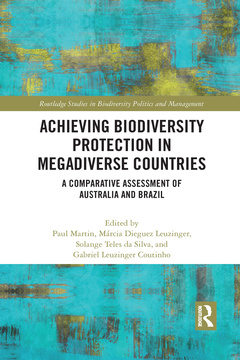Description
Achieving Biodiversity Protection in Megadiverse Countries
A Comparative Assessment of Australia and Brazil
Routledge Studies in Biodiversity Politics and Management Series
Language: English
Subjects for Achieving Biodiversity Protection in Megadiverse Countries:
Keywords
Regional Natural Resource Management Organisations; biodiversity protection; EPBC Act; environmental law; ICMBio; legal doctrines; Ministry Of The Environment; NGOs working; Regional Natural Resource Management Bodies; megadiverse countries; EPBC; Protected Areas; Biodiversity Governance; Marine Protected Areas; Brazil’s Gdp; Marine Governance; GBR; Civil Society; Biodiversity Conservation; Surfing Reserves; Surf Breaks; Uluru Kata Tjuta; Marine Biodiversity; NSW NPWS; Dairy Australia; GBRMP; Native Title; Broadacre Agriculture; Comprehensive MSP
Publication date: 12-2021
· 15.6x23.4 cm · Paperback
Publication date: 03-2020
· 15.6x23.4 cm · Hardback
Description
/li>Contents
/li>Readership
/li>Biography
/li>
This volume systematically analyses why legal doctrines for the protection of biodiversity are not sufficiently effective. It examples implementation in Australia and Brazil, two megadiverse countries with very differing legal and cultural traditions and natural environments.
Substantial effort goes into the development and interpretation of legal doctrines for the protection of biodiversity in national and international law. Despite this, biodiversity continues in steep decline. Nowhere is this more evident than in megadiverse countries, such as Australia and Brazil, which possess the greatest number and diversity of animals and plants on Earth. The book covers a wide range of topics, including farming, mining, marine environments, indigenous interests and governance. Achieving Biodiversity Protection in Megadiverse Countries highlights specific causes of underperformance in protecting diverse terrestrial and marine environments. It provides proposals for more effective implementation in these two jurisdictions, relevant to other megadiverse territories, and for biodiversity protection generally. Each chapter was written by teams of Australian and Brazilian authors, so that similar issues are considered across both jurisdictions, to provide both country-specific and generalisable insights.
Achieving Biodiversity Protection in Megadiverse Countries will be of great interest to students and scholars of environmental law and governance and biodiversity conservation, as well as policymakers, practitioners and NGOs working in these fields.
List of figures
List of tables
List of contributors
Foreword
Preface
List of acronyms and abbreviations
1: The issues, methods and evidence
2: Controlling the biodiversity impacts of agriculture
3: Biodiversity risk management in mining
4: Creating and managing marine protected areas
5: Social justice and the management of protected areas
6: Low impact recreational use and biodiversity protection
7: Partnered governance of biodiversity
8: Biodiversity intelligence from satellites
9: The challenge of using drones
10: Funding biodiversity conservation
11: Governing the governance system
12: Strategies to improve outcomes
Appendix A: Legislation list
Appendix B: International material
Appendix C: Cases
Index
Paul Martin is the Director of the Australian Centre for Agriculture and Law at the University of New England in Australia, and a member of the Research Committee of the IUCN Academy of Environmental Law. He has conducted extensive research on the implementation of biodiversity protection a number of countries.
Marcia Dieguez Leuzinger is an Environmental Law Professor at Brasilia University Centre – UniCEUB, and a State Attorney for Parana. She has undergraduate, masters and doctoral degrees in Sustainable Development from Brasilia University – UnB and leads the Environmental Law and Sustainable Development Research Group at UniCEUB.
Solange Teles Da Silva is a Law Professor at Mackenzie Presbyterian University. She graduated in Law at Sao Paulo University and has a PhD in Environmental Law at Paris I – Pantheon Sorbonne University. She has a CNPq Research Productivity Fellowship in Brazil, and is the Leader of the Research Group on Law and Sustainable Development. She is actively involved in the IUCN Academy of Environmental Law.
Gabriel Leuzinger Coutinho is an electrical engineer with an MBA in Project Management from the Fundação Getúlio Vargas, and an MSc in Sustainability Policy and Management from the University of Brasília (UnB). He is currently a PhD student at UnB's Center for Sustainable Development, and is a coordinator of the environmental law and sustainable development research group at UniCEUB.




